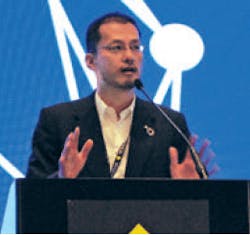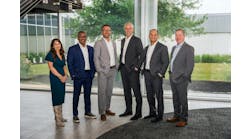Shigeyoshi Uehara, vice president, IA Process Control Instruments business, Yokogawa Electric Corp., describes how his company has expanded its technology and services to partner even more closely with its customers on their highest-level business challenges.
No longer content to provide control systems and instrumentation to the process industries, Yokogawa Electric Corp. has built out the top end of its technology and services portfolio, and is aiming to partner even more closely with its customers on their highest-level business challenges.These sweeping issues include rapidly changing business environments, supply chain visibility and optimization, sustainability and the circular economy, as well as profitability holistically optimized throughout the entire lifecycle of a production facility—from design through decommissioning and every stage in between.
“Digital transformation is bringing on a profound transformation of the organization,” said Shigeyoshi Uehara, vice president of Yokogawa's IA Process Control Instruments business, during his opening keynote address shi Uehara, vice president, IA Process Control Instruments Business, Yokogawa Electric Corp., during his keynote address on Sept. 11 at the opening of Yokogawa Users Conference North America 2018 in Orlando, Fla. “We hope to be the partner you rely on, to help make you ready.”
Uehara acknowledged that making the leap from preferred supplier of process automation systems to trusted partner will require Yokogawa to develop forward-looking collaborations based on shared vision with its customers, as well as delivery of best-in-class performance, profitability and continuous value creation. To achieve thee goals, Yokogawa has invested heavily in expanding its business domain expertise in recent years, notably through its 2016 acquisition of KBC Advanced Technologies. KBC’s expertise in the energy and chemical industries, along with its own acquisition of Industrial Knowledge and investment in Soteica Visual Mesa, are enabling Yokogawa to bring together operational technology (OT) and informational technology (IT) solutions expertise under an umbrella of business strategy consulting.
“These acquisitions brought new expertise to the organization,” explained Uehara.
In fact, Yokogawa presently offers a full portfolio of solutions along the IT/OT spectrum: from field instruments and analyzers to distributed control and safety instrument systems on the OT side; to new IIoT sensors, edge/fog computing solutions, energy management and simulation on the IT/IIoT side; and brings them together with strategic consulting, process analysis with machine learning, and profit-driven operations expertise.
The company also recently rebranded its automation technology and services portfolio under the OpreX banner, including the OpreX Measurement, OpreX Control, OpreX Execution, OpreX Transformation and OpreX Lifecycle offerings. The new OpreX portfolio is intended to offer benefits in the areas of resilient operation, optimized production and business innovation. The company’s combined capabilities in these arenas will deliver annual benefits in the range of $10 million to $100 million to a typical 200-bpd refinery, reported Uehara.
Under the banner of “Synaptic Business Automation,” which was also the theme of this year’s users conference, Yokogawa sees the opportunity for its customers to benefit by working together to connect all aspects of their businesses, much like a neural network.
“Synaptic Business Automation creates sustainable value by connecting everything in our customer’s organization,” Uehara said. “Yokogawa integrates its business and domain knowledge with digital automation technologies, and co-innovates with their customers to drive business process transformation.”
In addition, Eugene Spiropoulos, Yokogawa systems consulting manager, offered a guide to Yokogawa’s latest systems technology in his "Yokogawa Systems Update" presentation this week at the users conference. "To enable our Synaptic Business Automation initiative, our automation solutions have been organized into five categories under our new OpreX platform," explained Spiropoulos. "This will help everyone better understand our systems, gain some added direction for the future, and see how they work together and relate to you."
The five major OpreX categories are:
- OpreX Transformation that includes Yokogawa's manufacturing execution systems (MES), advanced solutions, simulation and optimization tools.
- OpreX Control that incudes its distributed control systems (DCS), safety instrumented systems (SIS) and programmable logic controllers (PLCs).
- OpreX Measurement that includes all of its instrumentation and analytical devices.
- OpreX Execution that includes its smart junction boxes, modular engineering tools and system-independent loop-check devices.
- OpreX Lifecycle that brings together maintenance and planning tools such as the company’s System Health Check Tools, which enable users to view all of the hardware and software components in their applications and facilities.
Controller gains
Perhaps the most significant update Spiropoulos described are several major enhancements to Yokogawa's Centum VP R6.06 controller.
"Many of the improvements we've developed are directly based on feedback we've received from our end users over the years," added Spiropoulos. "For example, it's not generally known that Yokogawa was the first to introduce configurable I/O back in 1993 as part of our RIO product."
The innovations in Centum VP R6.06 include:
- Network I/O (N-IO) and Fieldnetwork I/O (FIO) running in one Field Control Station (FCS) controller, which lets users expand their network I/O deployments using their existing infrastructure technology. This will be especially useful to greenfield projects, particularly in upstream and remote I/O configurations. It will also reduce the cost of designing system cabinets for N-IO configuration.
- Automation Design (AD) Suite engineering environment delivers faster performance and allows users to visualize and collaborate with remote colleagues. Other benefits include application and software module reusability for reduced engineering time.
- FCS online upgrade for continuous processes will maintain control function quality without disturbing production. Different technologies in different lifecycles will be able to use it to work together, enabling users to have more flexibility when and how to upgrade their applications and facilities.
- Windows Server 2016 adoption provides long-term platform support.
- Run-time virtualization on R6.06 aids in operating expenditures by improving computer hardware maintainability and reducing power consumption, as well as simplifying system design.
"Yokogawa has used virtualization on Level 3 applications for a long time, and also employs it at the engineering level, so users can work in a collaborative environment," said Spiropoulos. "However, it's the FCS online upgrade that fulfills one of Yokogawa's most stringent points, which is not leaving customers behind as new products are introduced. This gives users huge flexibility, and maximizes their ability to maintain uptime. Plus, with the FCS online upgrade, they can perform updates on the fly without having to shutdown."
Spiropoulos added these innovations enhance the high I/O density that FCS already delivers. "FCS is a beast that's four times more powerful than the average I/O controller," he explained. "This is aided by the fact that N-IO is smart, configurable I/O that's truly universal, so users don't have to make physical changes to use many different signals. N-IO allows the validation testing and device configurations that are usually done during factory acceptance test (FAT) to happen without having the actual system anywhere in sight. This lets users ship early, team up at the junction box stage, and have much more flexibility to sort out their systems.
“This is all about improving how our engineering and other customers feel at the end of the day,” Spiropoulos added. “We try to make our products as painless to use as possible and deliver a much value as possible.”





